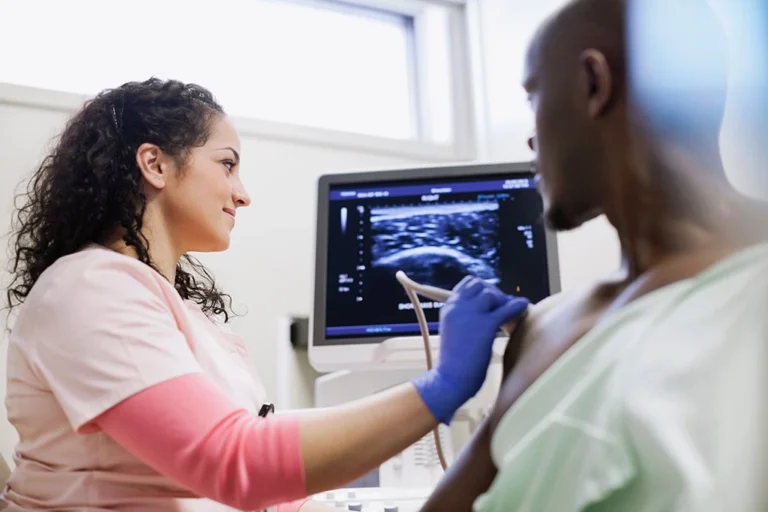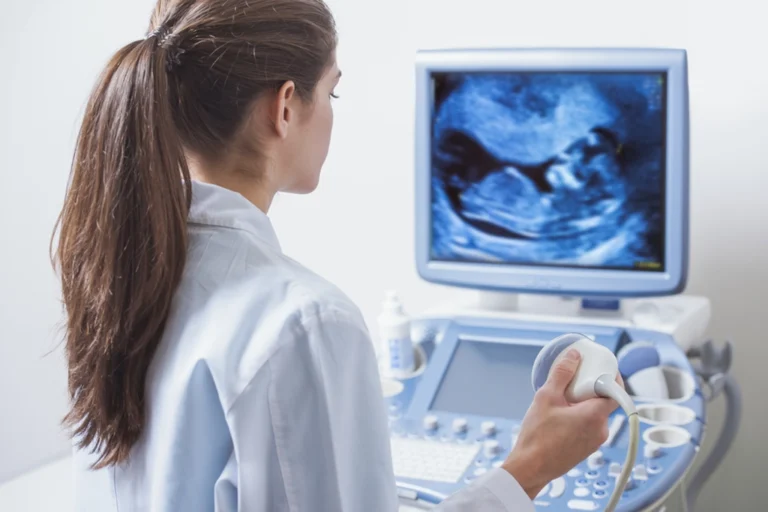When people hear the word “ultrasound,” it is very common to have the thought of babies cross their minds. Pregnancy ultrasounds are used often to monitor the growth of an infant in the womb over time. The use of ultrasounds span way beyond women’s imaging studies. Radiologists can use ultrasound for a wide number of purposes. Here are other reasons why an ultrasound in Voorhees, NJ may be ordered.
Does an ultrasound visualize blood vessels?
A vascular doppler ultrasound is a specialized type of ultrasound that is used to visualize arteries and veins to monitor the health of blood vessels. A vascular doppler ultrasound uses color-coded images to measure the speed and direction of blood flow throughout various parts of the body.
When is a vascular doppler ultrasound ordered?
Commonly, this type of ultrasound is ordered alongside an echocardiogram (2D echo) to help further check on a patient’s overall heart function. A vascular doppler ultrasound can detect several vascular medical conditions such as deep vein thrombosis, chronic venous insufficiency, carotid artery disease, and others.
Can an ultrasound capture images of your thyroid?
Ultrasounds can be used to produce high-quality images of the neck where the thyroid gland is located. Palpable nodules are common in older adults and develop on the thyroid gland. Some of these nodules may be cancerous. An ultrasound can help visualize these nodules and determine if further medical intervention is needed.
How does an ultrasound visualize breast tissue?
Ultrasounds can be used in combination with other women’s imaging studies such as mammograms and breast MRI scans to detect early forms of breast cancer. A breast ultrasound can be used to gather more information about a mass or cyst. Currently, a 3D mammogram is the best way to detect early forms of breast cancer.
When is a breast ultrasound recommended?
In certain situations, a 3D mammogram is not feasible. Patients who are pregnant are unable to have mammograms due to radiation exposure. Women with dense breast tissue should have breast ultrasounds conducted as well. Dense breast tissue can make it difficult for radiologists to detect breast cancer with the use of mammograms. Breast ultrasounds prove to be very helpful in these situations.
How does an ultrasound help with the abdomen and pelvis
If a patient is experiencing ongoing pelvic pain or menstrual issues, an abdominal ultrasound may be ordered to view areas such as the uterus, cervix, ovaries, and fallopian tubes. Pelvic ultrasounds have been proven to be very useful for both men and women. A pelvic ultrasound can identify kidney stones, tumors, or urinary tract conditions. A transvaginal ultrasound may be used to help identify different abnormalities in a women’s reproductive system. A transvaginal ultrasound can identify uterine anomalies, polyps, fibroids, and cancer.
How to schedule an appointment with us
At South Jersey Radiology Associates, our subspecialized radiologists can perform and interpret all forms of ultrasounds. When your physician refers you to get an ultrasound, choose SJRA as your destination to ensure you receive the highest imaging quality possible at up to 60% less than hospital-owned facilities. If you are interested in scheduling an ultrasound, reach out to any of our following locations:
- Cherry Hill Office – Cherry Hill, NJ
- Haddonfield Office – Haddonfield, NJ
- Marlton (Greentree) Office – Marlton, NJ
- Medford Office – Medford, NJ
- Moorestown Office – Moorestown, NJ
- Mount Laurel Office – Mount Laurel, NJ
- Turnersville Office – Turnersville, NJ
- Route 73 (Voorhees) Office – Voorhees Township, NJ
- Voorhees (Carnie Blvd) Office – Voorhees Township, NJ
- Sewell (Washington Twp) Office – Sewell, NJ
- West Deptford Office – West Deptford, NJ
- Willingboro Office – Willingboro, NJ
- Women’s Center at Cross Keys – Sewell, NJ
- Women’s Center at Medford – Medford, NJ
- Women’s Center at Mount Laurel – Mount Laurel, NJ
- Women’s Center at Voorhees – Voorhees Township, NJ
Learn more about the board-certified subspecialized radiologists who read and interpret studies at SJRA here.
Frequently Asked Questions
While ultrasound is commonly associated with pregnancy monitoring, it has various applications beyond women’s imaging studies. Radiologists use ultrasounds for a wide range of purposes, including assessing the heart and blood vessels, thyroid imaging, breast cancer detection, and examining abdominal and pelvic structures.
A vascular doppler ultrasound is a specialized type of ultrasound that visualizes arteries and veins to monitor blood vessel health. By using color-coded images, it measures the speed and direction of blood flow throughout the body. A vascular doppler ultrasound can detect conditions like deep vein thrombosis, chronic venous insufficiency, and carotid artery disease, often ordered alongside an echocardiogram (2D echo) to assess heart function.
Yes, ultrasound can produce high-quality images of the neck to visualize the thyroid gland. It is commonly used to identify palpable nodules that develop on the thyroid gland, particularly in older adults. Ultrasound imaging helps determine if further medical intervention is necessary, as some nodules may be cancerous.
Ultrasound complements other women’s imaging studies like 3D mammograms and breast MRI scans to detect early forms of breast cancer. It provides additional information about breast masses or cysts. While 3D mammograms are the preferred method for early detection, certain situations may necessitate alternatives. Ultrasound is recommended for pregnant women who cannot undergo mammograms due to radiation exposure and for women with dense breast tissue, which can make cancer detection challenging with mammograms alone.
Abdominal ultrasounds are ordered when patients experience ongoing pelvic pain or menstrual issues. They help visualize structures such as the uterus, cervix, ovaries, and fallopian tubes. Pelvic ultrasounds are beneficial for both men and women, as they can identify conditions like kidney stones, tumors, urinary tract issues, and reproductive system abnormalities in women. Transvaginal ultrasounds are sometimes used to assess uterine anomalies, polyps, fibroids, and cancer.
To schedule an ultrasound appointment, you can contact any of the following locations:
• Cherry Hill Office – Cherry Hill, NJ
• Haddonfield Office – Haddonfield, NJ
• Marlton (Greentree) Office – Marlton, NJ
• Medford Office – Medford, NJ
• Moorestown Office – Moorestown, NJ
• Mount Laurel Office – Mount Laurel, NJ
• Turnersville Office – Turnersville, NJ
• Route 73 (Voorhees) 73 Office – Voorhees Township, NJ
• Voorhees (Carnie Blvd) Office – Voorhees Township, NJ
• Sewell (Washington Twp) Office – Sewell, NJ
• West Deptford Office – West Deptford, NJ
• Willingboro Office – Willingboro, NJ
• Women’s Center at Cross Keys – Sewell, NJ
• Women’s Center at Medford – Medford, NJ
• Women’s Center at Mount Laurel – Medford, NJ
• Women’s Center at Voorhees – Voorhees Township, NJ
Our team of board-certified subspecialized radiologists performs and interprets all ultrasounds. Learn more about our radiologists by visiting our physician profiles.



